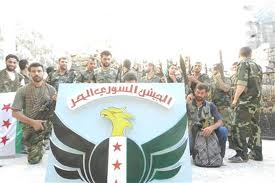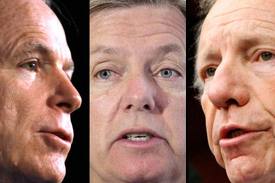 BEIRUT, Lebanon — Syrian rebels claimed Friday night that they had freed 350 prisoners held in a security building in the divided city of Aleppo, while in the opposition stronghold of Homs the rebels’ supporters held a public protest against the disorganization and lack of unity among their forces.
BEIRUT, Lebanon — Syrian rebels claimed Friday night that they had freed 350 prisoners held in a security building in the divided city of Aleppo, while in the opposition stronghold of Homs the rebels’ supporters held a public protest against the disorganization and lack of unity among their forces.
Taken together, the developments amounted to a rare breakthrough but also a sign of strain for the armed opposition, as the 18-month uprising against President Bashar al-Assad appeared to settle into a protracted stalemate, with his forces having the advantage in military might, but being unable to stamp out the insurrection.
A rebel assault on Aleppo that has lasted for weeks appears to have stalled in the face of the Syrian military’s artillery and air power, but rebels there said that after a daylong battle they had captured a military headquarters in the neighborhood of Hanano with the 350 captives inside. The rebels called them political prisoners.
The Syrian Observatory for Human Rights, an opposition group based in Britain that tracks the violence, said 4 opposition fighters died in the attack and at least 18 government soldiers were killed. Because Syria bars most foreign journalists from the country, those accounts could not be confirmed independently.
While the fighters in Aleppo struggled to advance in block-by-block combat, opposition supporters in Homs, one of the first cities to rise up, were holding what some called the first protest against the fractious alliance of rebel brigades known as the Free Syrian Army.
“Instead of calling for the fall of the regime, we are protesting today to call for the unification of the Free Syrian Army,” said an activist in Homs who would allow the use of only his first name, Mohamed, because of fears for his safety and that of his family.
“It’s humiliating,” he said over an Internet connection, with the chants of demonstrators ringing in the background.
As an example of the rebels’ lack of coordination, Mohamed recounted the story of an initially successful assault three days ago on three government checkpoints. The fighters captured the checkpoints, made off with weapons and ammunition, but failed to leave anyone to guard the positions.
“How could they do something like that?” he asked. “The regime forces came back and seized back the checkpoints. But if the Free Syrian Army were united, we wouldn’t make such a horrible mistake.”
“It is really a shame that after Homs was called the capital of the revolution, Homs no longer deserves this name,” Mohamed added. “Hundreds of families living under the siege here have been so disappointed.”
In Damascus, the capital, two bombs killed at least six of Mr. Assad’s security officers and allied militiamen, known as the shabiha.
The first bomb was detonated around the end of Friday Prayer near a group of about 50 police officers and shabiha who had gathered outside a mosque in the neighborhood of Ruknideen to deter any demonstrations by worshipers leaving a mosque, witnesses said. State news media said the bomb had been planted on a moped, and the explosion killed six police officers and civilians while wounding others. Syrian television showed a bloodstained wall, crumpled vehicles and rubble left by the blast.
“The car bombs and blasts have become a daily thing in Damascus and its suburbs,” said a 50-year-old resident of the neighborhood nearby. “These blasts and car bombs are the biggest proof that the Assad regime no longer has control on the ground,” he said, speaking on the condition of anonymity out of safety concerns. “The regime closes the city’s entrances to prevent such an attack, but today’s explosion proves there are sleeper cells inside the city that can carry out any attack in any time.”
A second bomb exploded about two hours later in a car in the upscale neighborhood of Mezzeh. Syrian state news media said that it went off on the street between the Information Ministry and the Justice Ministry, and that no fatalities were reported.
The bomb exploded in a patrol car, said a witness, who described ambulances moving wounded security men. But the report of no deaths could not be corroborated. Most of the capital was under a tight lockdown, with Syrian soldiers and tanks surrounding the mosques in an attempt to deter post-Friday Prayer demonstrations, and heavily guarded checkpoints ringing the city.
Residents and opposition groups reported shelling in the area around the crowded Yarmouk camp for Palestinian refugees, along with street fighting in the neighborhoods of Bebila, Kazaz and Tadamon as the military continued its promised drive to “cleanse” greater Damascus of rebels.
But in some places, hundreds of opposition supporters nonetheless held public rallies under the protection of Free Syrian Army fighters to demonstrate their continued hold on at least a handful of suburbs despite the military’s campaign to uproot them. After weeks of attacks by both soldiers and aircraft, residents said that opposition fighters still controlled a number of pockets around the capital.
“The regime announced many times that its forces will ‘purify’ or ‘cleanse’ or ‘liberate’ the Damascus suburbs from the ‘armed gangs,’ ” said a 28-year-old demonstrator who gave his name as Osama at a rally in the Al Hajar Al Aswad neighborhood. “But the regime lies in everything. The opposition fighters are fighting inside the city of Damascus while the Assad forces reattack the other districts with their tanks and helicopters.”
 Three United States senators — John McCain, Republican of Arizona; Lindsey Graham, Republican of South Carolina; and Joseph I. Lieberman, a Connecticut independent — on Friday declared their support for a proposal from Turkey for Western powers to create a protected buffer zone for the opposition within Syria’s borders. The senators, who were returning from a visit to the region, said that as fighting continued without Western support, militant Islamists were more likely to gain power among the opposition.
Three United States senators — John McCain, Republican of Arizona; Lindsey Graham, Republican of South Carolina; and Joseph I. Lieberman, a Connecticut independent — on Friday declared their support for a proposal from Turkey for Western powers to create a protected buffer zone for the opposition within Syria’s borders. The senators, who were returning from a visit to the region, said that as fighting continued without Western support, militant Islamists were more likely to gain power among the opposition.
“The opposition has effectively seized control of a piece of land in northern Syria,” The Associated Press reported Mr. Lieberman as saying. “If we help them protect themselves from Assad’s helicopters and fixed-wing aircraft, they can establish a transitional government.” He said such a step would allow exiled civilian opposition leaders to connect with rebel fighters.
Mr. Lieberman expressed confidence that if the Western powers warned the Assad government that an attack on the safe zone would be greeted with “a vigorous response, they would not attack it.”
NY Times

Leave a Reply
You must be logged in to post a comment.